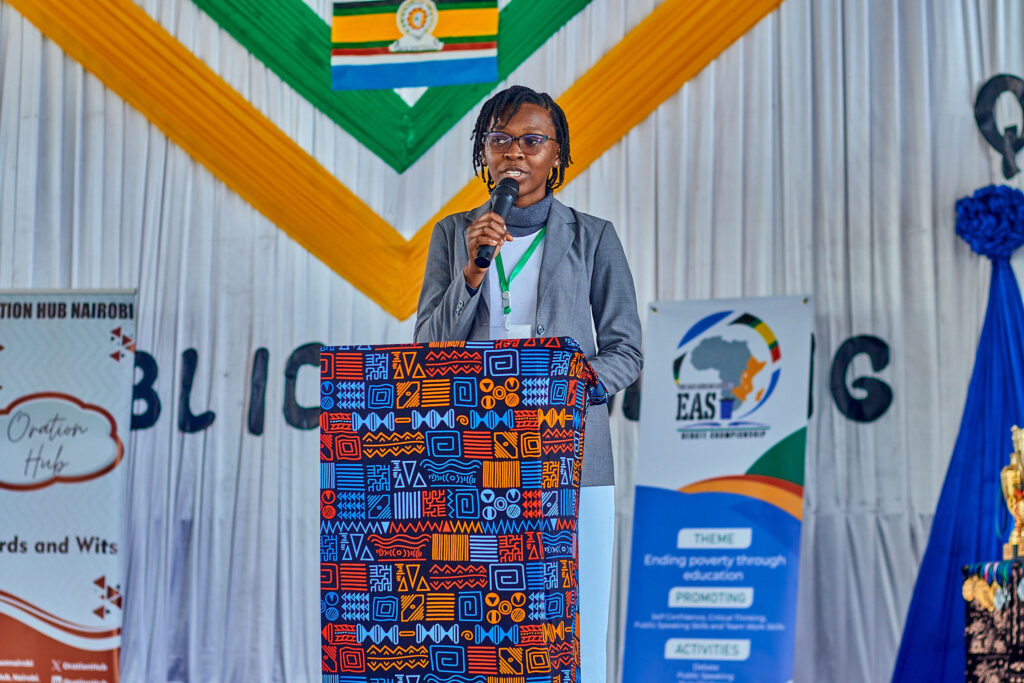
With heavy preparations and the microphones ready, the stage was set. From Kenya and Uganda, to Rwanda, Tanzania, and even Burundi, students came together here at The School of St Jude, Smith Campus. This was not just a normal gathering; it was a celebration of ideas, persuasion, and the art of speaking truth with passion.
The East African Schools Debate Championships is one of the biggest competitions hosted annually in Tanzania that features academic sports like debate, public speaking, and quiz. This tournament not only brings students together, but also sharpens the communication skills of the young East African generation.
Mr Joseph, Head of Languages at St Jude’s Secondary and public speaking club mentor, chaired the organising committee for the tournament. He says he is very proud to be a part of the team that nurtures young minds.
“It was great for students from other countries to experience the St Jude’s values and culture. Nothing beats the feeling of bringing young voices to one platform,” he says
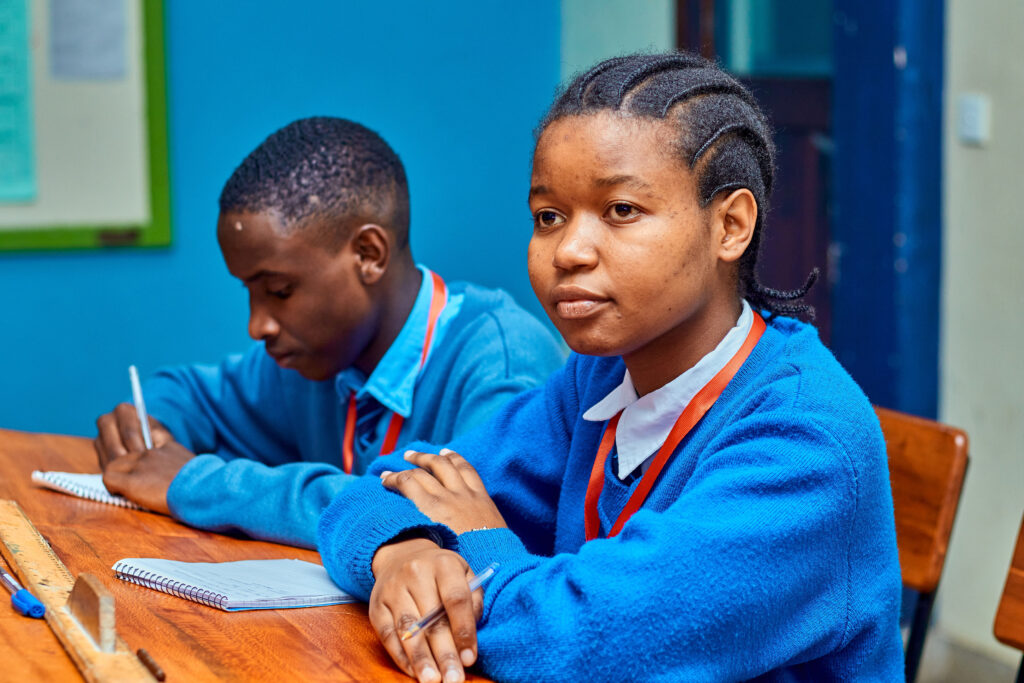
Barriers were certainly broken this year, with over 350 students from across East Africa attending the tournament: an increase of more than 150 from last year. Over 40 students from St Jude’s had the invaluable opportunity to learn from the best young debaters and speakers across the region.
Uganda took home the top prize in the debate category, while Kenya earned the top award in public speaking. St Jude’s was well represented, with three students making it to the final six in the public speaking competition.
One of those finalists was Form 5 student Lillian, who was thrilled to be able to represent
St Jude’s.
“The tournament was challenging. There were lots of students from across East Africa and it was very competitive. When my name was mentioned as one of the finalists, I was really nervous, but I had so much fun participating,” she says.
Lillian, who especially enjoyed the debate section of the competition, explains that delivering a strong speech requires strong preparation. Like many of her fellow students, she is an active member of the public speaking and debating clubs at St Jude’s, where students meet weekly to sharpen these
essential skills.
“In our public speaking and debating clubs, we learn more about how to become better speaker. We also get to practise at competitions like this. We believe that practice beats talent. It starts with believing
in yourself, then being confident, and never giving up,” she says.
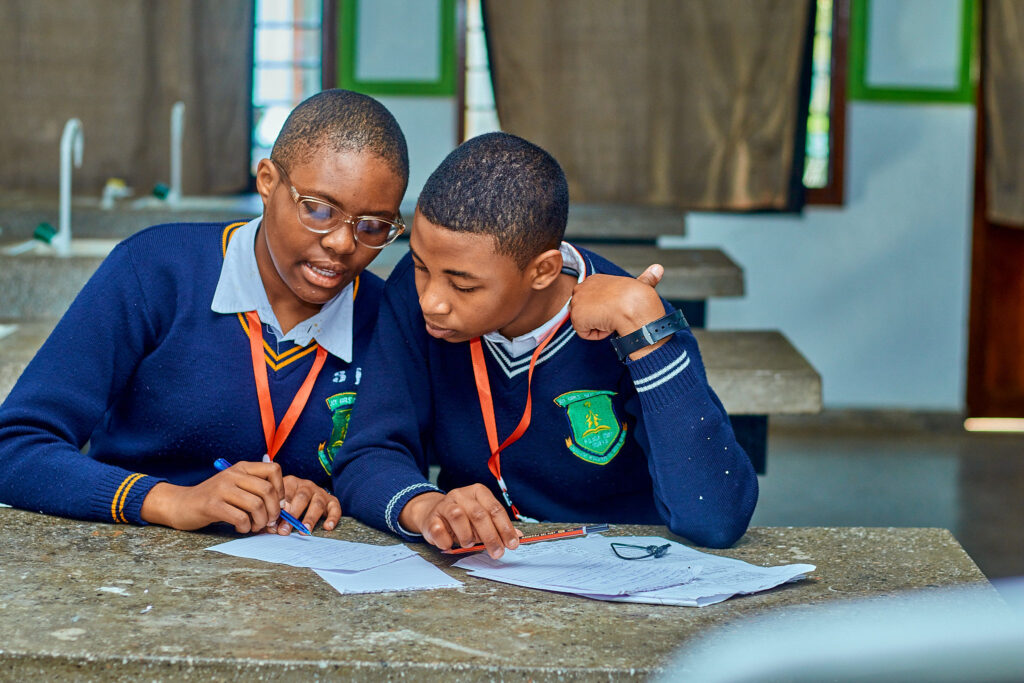
St Jude’s also proudly secured second place overall in the tournament, a testament to the hard work and dedication of both the students and the staff. Both Mr Joseph and Lillian believe that opportunities like this competition are important in helping students develop key 21st century skills.
“We have seen many students from Uganda, Kenya, Burundi travelling long distance to come in this tournament. We’re already looking forward to next year and hope we will have even more students participating in 2026,” says Mr Joseph.
As the curtains closed on this year’s East African Schools Debate Championships, the energy, passion, and determination of the students left a lasting impression. With each debate made and every speech delivered, the students demonstrated that they are not only ready to be heard but are already becoming the voices of change across East Africa.
After moving from her home in Australia to Africa at the age of 22, Gemma Sisia decided to start a school in Tanzania with the mission of educating the nation’s smartest students who did not have the means to attend private school. 16 years on, the School of St Jude is thriving, with around 1800 students on academic scholarships, and 90 per cent of the funding coming from Australian donors. Ms Sisia joins Sky News with one of her star students, Godwin, to discuss the inspiration behind founding the school and the great things its students are achieving.
For decades International Women’s Day (IWD) has been bringing awareness to equality and empowering women from all walks of life to achieve their hopes and dreams in business and community.
Australian humanitarian Gemma Sisia (nee Rice), who established the School of St Jude in Tanzania in 2002, is one of the many women making a difference to underprivileged people on the world stage.
She will be special guest at the IWD luncheon to be hosted by Salamander Bay Rotary Club at Soldiers Point Bowling Club on Wednesday, March 6, from 11.30am.
Rotary president Ina George said that the club was proud and honoured to have Gemma to provide her inspirational story on a day celebrating the strength, courage and resilience of women everywhere.
“We are indeed fortunate to have Gemma as our guest speaker to provide an insight into how she started fundraising to invest in the education of Africa’s poorest and the support she received from friends, family and Rotary groups,” Ms George said.
“We in Port Stephens are also fortunate to have women in prominent leadership roles in business and community who are passionate about making a difference.”
Some of those women include Leah Anderson, president of the Tomaree Business Chamber who was founding member and first president of the Port Stephens Women In Business.
Emily Perry now heads the Women In Business organisation, and Kathy Rimmer, the Port Stephens Business Person of the Year, is into her second year as president of the Nelson Bay Rotary Club.
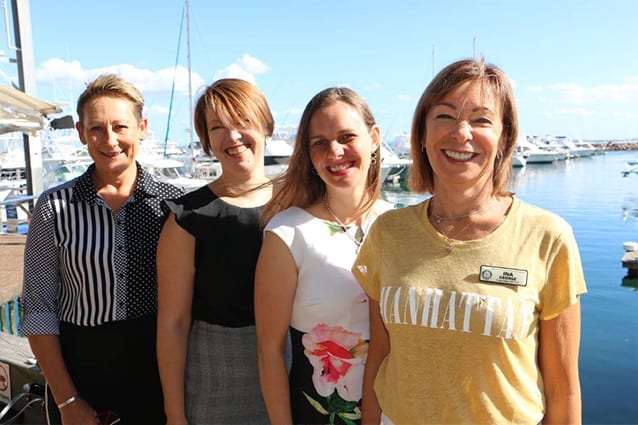
Ms Anderson said that organisation and prioritisation were key elements in most women’s lives, many who have to juggle family life with career.
“Most of the successful women I know have very busy lives but they mange them through planning and making time for family, socialising and charity work,” said Ms Anderson.
Ms Perry, who juggles two businesses and family with two young children, said she was grateful for the support of Women In Business.
“The group has taught me many things and the motto of ‘Connect, Inspire, Support’ sums it up. We have a fantastic mentoring program, we are active in support of each other and also in support of charitable organisations.”
Ms Rimmer said that work/life balance became most essential to her after she was diagnosed with multiple sclerosis in 2013. “I learned the art of saying no and the importance of doing what you love, and love what you’re doing.”
Charlie Elias, The Port Stephen Examiner (read original article here).
The Lions Club in the Middle East have pledged to support the School of St Jude, an Arusha-based education centre, build a new girls secondary school for 600 students.
This was announced recently after the 16-year-old school participated in the Lions Clubs International Forum in Dubai where a special project ‘Fighting Poverty through Education’ was launched.
During the event, the school clearly stated its intention of providing women and girls with equal access to education as per the United Nations Sustainable Development Goal number five.
Currently the co-educational school, which runs primary and secondary wings, has a total of 1,800 pupils, 1,400 of whom are boarders in its three campuses in and around Arusha.
The proposed all-girls school hopes to admit 600 girls, according to Ms. Leonie Trubshoe, the school official in charge of communication and media matters.
The Lions clubs will actively support our drive to build a new girls secondary school for 600 students, she said, adding that this would ensure opening up more chances for those from the poor families.
We love to empower our female students. We provide an equal opportunity for all students regardless of religion, tribe or gender’, she told the Citizen.
About 60 per cent of all students at the education institution established by Ms. Gemma Sisia, an Australian national in 2002, are girls.
The School’s spokesperson could not reveal the estimated cost of the new campus for the girl students. It offers free education targeting the young learners from the poor families.
It is estimated that about 90 per cent of funds used for running the education centre, which employs 300 staff members, each year is raised in Australia and other countries abroad.
The St Jude School started with a campus in Moshono, followed later by a much larger and famous campus at Usa River (near the Ngurdoto Mountain Lodge) while the third one was set up at Moivaro.
The Tanzanian Citizen (read the original article here).
Bega solicitor Andrew Warren is pumping up the tires ready for a cross-country bicycle ride – in Tanzania!
In February 2019, Mr Warren plans to ride the length of the African country, alone and unsupported, to raise funds for the School of St Jude in Arusha, Tanzania.
All up, the ride covers about 1600km.
“If you agree to sponsor me, you will get your money back if I do not pedal every kilometre of the way – I promise!” Mr Warren said on his GoFundMe page.
Since only launching his fundraising page on Wednesday, December 5, he has already raised more than $2500 of his $3000 stated goal.
“If I can raise $3000 from sponsors of my ride, that will pay for a student to receive an education for a year,” Mr Warren said.
Mr Warren said St Jude’s provides a free, non-demoninational, high-quality education to children who, due to poverty and social pressures, would otherwise be unlikely to complete their schooling.
“I made contact with Gemma Sisia [the school’s founder] about 15 years ago – she’s an amazing woman,” Mr Warren said this week.
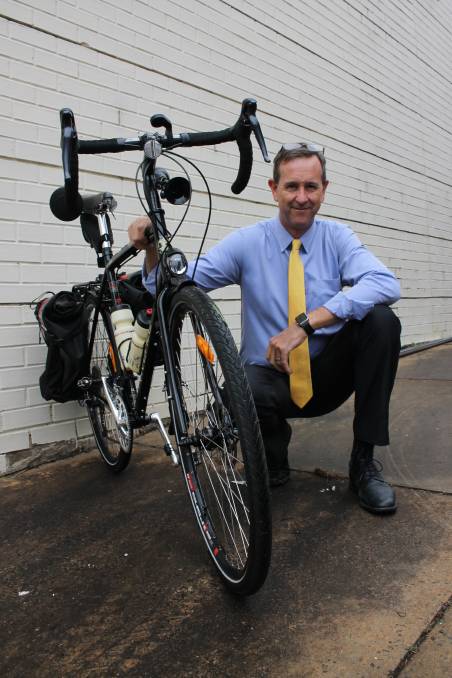
“She started the school with mud bricks and three children. Now it’s three campuses with 1800 children.
“We sponsored some kids at the school years ago and then this year we visited the school on a family holiday.
“It costs only $3000 a year to sponsor a student and for they St Jude’s provides full board, uniforms, all meals, books and pencils and so on.
“Every single one of their students was chosen because they combined academic promise with a desperately poor background and a great attitude to work. They feed them, house them, educate them, and do everything possible to ensure their students’ wellbeing and future success.”
Mr Warren said he could ride anywhere in order to raise some money for the school and its students, “but it seemed more appropriate to go back to Tanzania”.
He heads out on February 8 – “it’s all booked in so I can’t back out now!”
“I’m not a competitive rider, just your typical middle aged man in lycra. I just enjoy going for a ride.”
Mr Warren said he hoped to find guest houses along the route, but given the African country’s landscape that may not always be possible.
“So I’m packing a tent but maybe I will need to hang a sign on it saying ‘Lions not welcome’,” he joked.
Bega District News (read the original article here).
Gemma Sisia’s parents, Sue and Basil, fervently believed in the power of education to change the future.
The couple, who raised eight children on a sheep wool farm in New South Wales, Australia, made significant sacrifices to ensure that their seven sons and one daughter had excellent educational opportunities. They also were strong believers in community service.
“They had an open-door policy at home for people wanting to come, stay, and have someone to listen to them,” she says. “My parents constantly showed me how important it is to help others.”
So, it’s not surprising that after she graduated from the Universities of Melbourne, Northern Territory and New England at 22 years of age, she took her newly minted Bachelor of Science degree and Graduate Diploma in Education to Africa. She taught math, science, and sewing at an under-resourced private girls’ school in Uganda.
She loved the work but was aware that her students’ parents were wealthy enough to afford private school for their girls. Gemma and the local art teacher who were good friends often talked about how to break the cycle of poverty that was rampant in East Africa, particularly for underprivileged girls. They concluded that without raising the standards of education across the board in the region, no amount of foreign money could alleviate the widespread poverty.
“That’s where the seed of building a school was planted,” she said.
Then came a fateful trip to Tanzania to visit one of that nation’s beautiful wildlife parks – and Gemma fell in love with her safari guide. The two married, and while Gemma was looking forward to raising her own family (the couple has four children), she knew she also wanted to pursue her dream of a school that would provide an excellent education to Tanzania’s poorest children.
She confided her dream to a close friend in Australia, who gave her 10 dollars. Gemma promptly opened up a bank account with that first donation. Her father-in-law gifted her with two acres of land in the Arusha District of Tanzania, so she’d have a site for the school. And her father, Basil, introduced her to the Rotarians.
Gemma shared her dream with local Rotary clubs in and around New South Wales. She told them the startling statistics of how poverty wrecks havoc with education in East Africa: according to UNICEF, 70 percent of children aged 14–17 years in Tanzania are not enrolled in school. Less than 4 percent make it to the final two years of secondary education.
“Without our school, these students might not attend school at all, or if they were one of the lucky few, their schooling would have been in an under-resourced government school with a handful of teachers for every 1,000 pupils,” she says. “And without a good education, they won’t be able to gain skilled employment, and their families would continue to lead lives of perpetual economic struggle.”
Gemma was persuasive. By the end of her “speaking engagement” weekend, the Rotary clubs raised $20,000 towards the school. Not only that, teams of volunteers out of the clubs came to Arusha to build the two blocks of classrooms and a playground. The Brisbane Planetarium Club built the foundations of the school library.
Gemma named the school after the patron saint of hopeless causes, saying it is a nod to her unwavering faith in a cause that thousands of people, united by a shared dream, have worked tirelessly to support.
The School of St Jude opened in 2002 with a mere three students, but it grew quickly. Now enrollment is almost 2,000 and the school’s three campuses (one primary, one secondary and one boarding) are spread over 50 acres. All the students attend on full scholarships, which not only pay for their teachers, books and supplies, but transportation, school uniforms and at least one hot meal a day. Students old enough to board (over two-thirds of the pupils attending St Jude’s) live in dorms on campus and are provided three meals a day.
The school has a competitive and highly extensive application process.
Each year, over 3,000 candidates from government schools are invited to attend the selection process (where up to 150 places are available across first-grade, seventh-grade and ninth-grade). They complete a series of tests, with the youngest needing to show an enthusiasm for learning and some proficiency in Swahili, the native language, and the older students completing tests in math, science, and English. Ultimately, the children will be taught in English, as most universities and jobs in the key professions require fluency in English.
The students who show the most promise are then assessed as to their financial and social circumstances to make sure the family falls within the income guidelines and are truly deserving of a place at St Jude’s.
Once they are accepted, they are given a free, high-quality and varied education, plus resources to help them in their post-secondary education or training. The co-educational student body reflects a wide swath of Tanzanian society, with students representing numerous religions and tribes.
Seventeen years after opening its doors, the first few cohorts have graduated from the school. Gemma says that most of these 392 graduates have undertaken a year of community service, voluntarily teaching core subjects to thousands of children in local government schools who otherwise wouldn’t have had teachers. Many have now also gone on to study at universities in much-needed fields such as medicine, engineering, law, and education.
“A number of our students have earned international recognition for science and entrepreneurship,” she adds, “and we will soon be seeing our first university graduates!”
Throughout it all, Rotarians and other Australian-based donors have been the core of The School of St Jude supporters, with a now growing donor-base in America too. Gemma returns to Australia every year for a multi-week tour to drum up support as part of the school’s annual fundraising campaign. It’s day after day of meetings, presentation, and events to secure the millions of dollars it takes to pay for a staff of about 300 local teachers and support staff as well as food, books, supplies, and campus maintenance.
“It’s always a killer itinerary, but it’s essential,” she says. “There are hundreds of local workers and thousands of students depending on it.”
Cindy May, Cindy May Marketing (read the original article here).